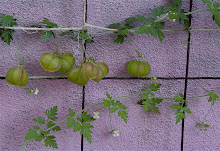skip to main |
skip to sidebar
 everyday I go outside, wiggle my toes into the dirt and mesquite leaf mulch, let the sun shine on my face and imagine rooting myself there.
everyday I go outside, wiggle my toes into the dirt and mesquite leaf mulch, let the sun shine on my face and imagine rooting myself there.
First, I envision the roots of a mesquite tree I saw on the side of a wash up near Arcosanti
- I had no idea that mesquites could develop such long, strong, tap roots...
then, I bring up images of saguaro roots that stretch out and around that magnificent plant for great distances in order to soak up every bit of moisture that comes and goes so quickly in the Sonoran desert.
I don't know - but - when I think about saguaros and how tall and balanced they are, I start to stretch out my arms and soak up more sunshine. I always relate to the saguaro more even though I am in awe of the mesquite.
Today, I realized, that although my roots in life are deep in many areas, I am so much more like a saguaro - preferring to spread out and explore many things to add balance to my life.
btw getting out of the house - huge - watching spiny lizzards, chuckwallas and desert birds - delightful.
early may beauty...
Today, I read an article in the NY Times published on May 4, 2008, called
Unboxed
Can You Become a Creature of New Habits?
By JANET RAE-DUPREE
about change and how it can stimulate one's life / brain. However, those who have studied change and its affect on us have found that it needs to be managed to produce the greatest rewards.
The researchers, Ms. Ryan and Ms. Markova, refer to "three zones of existence: comfort, stretch and stress. Comfort is the realm of existing habit. Stress occurs when a challenge is so far beyond current experience as to be overwhelming. It’s that stretch zone in the middle — activities that feel a bit awkward and unfamiliar — where true change occurs."
"Getting into the stretch zone is good for you,” Ms. Ryan says in “This Year I Will... .” “It helps keep your brain healthy. It turns out that unless we continue to learn new things, which challenges our brains to create new pathways, they literally begin to atrophy, which may result in dementia, Alzheimer’s and other brain diseases."
"...scientists speculate that getting out of routines makes us more aware in general.”
Ms. Ryan "recommends practicing a Japanese technique called kaizen, which calls for tiny, continuous improvements."
“Whenever we initiate change, even a positive one, we activate fear in our emotional brain,” Ms. Ryan notes in her book. “If the fear is big enough, the fight-or-flight response will go off and we’ll run from what we’re trying to do. The small steps in kaizen don’t set off fight or flight, but rather keep us in the thinking brain, where we have access to our creativity and playfulness.”
I wonder - if we indeed activate fear, are we also activating an adrenalin rush? So, if we are in a constant state of change, is it a constant high? hmmm
Anyway - I could relate to the "running away" part
...sometimes we have no control over the change that comes into our lives, how then do we go about managing our lives after that, to weather big changes? ...fall into old habits to keep life sane until the impact of the change is reduced to a stretch instead of a stress?
just wondering...
 everyday I go outside, wiggle my toes into the dirt and mesquite leaf mulch, let the sun shine on my face and imagine rooting myself there.
everyday I go outside, wiggle my toes into the dirt and mesquite leaf mulch, let the sun shine on my face and imagine rooting myself there.





